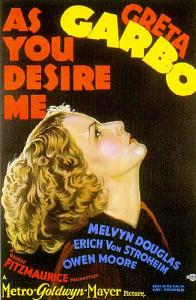| As You Desire Me | |
|---|---|
 Original film poster | |
| Directed by | George Fitzmaurice |
| Written by | Gene Markey Luigi Pirandello (play) |
| Produced by | George Fitzmaurice Irving Thalberg |
| Starring | Greta Garbo Melvyn Douglas Erich von Stroheim Owen Moore Hedda Hopper |
| Cinematography | William H. Daniels |
| Edited by | George Hively |
| Distributed by | Metro-Goldwyn-Mayer |
Release date |
|
Running time | 70 minutes |
| Country | United States |
| Language | English |
| Budget | $469,000 [1] |
| Box office | $1,363,000 (rentals) [2] |
As You Desire Me is a 1932 American pre-Code film adaptation of the 1929 play by Luigi Pirandello released by Metro-Goldwyn-Mayer. It was produced and directed by George Fitzmaurice with Irving Thalberg as co-producer. The adaptation was by Gene Markey, the cinematography by William H. Daniels, the art direction by Cedric Gibbons and the costume design by Adrian.
Contents
The film stars Greta Garbo and Melvyn Douglas, with Erich von Stroheim, Owen Moore and Hedda Hopper. The film's running time is about 70 minutes, making it the shortest of all Garbo's Hollywood films.